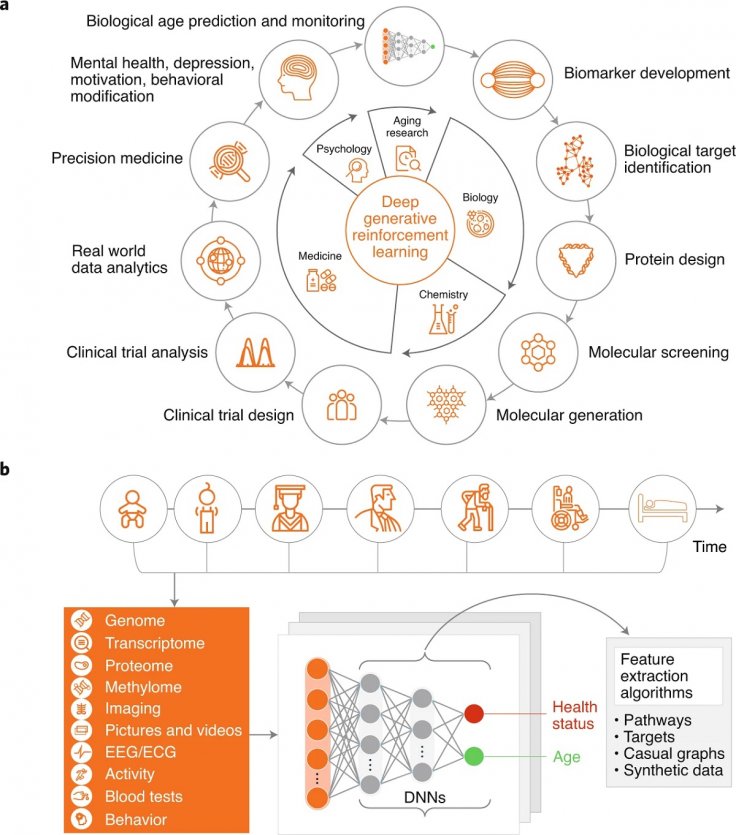For centuries, scientists have tried to work on formulas to extend human life. While scientific and medical advancements have pushed the average human life expectancy to 71 years worldwide, researchers are still trying to find out if it can be extended further. Now, a group of scientists is leaning on artificial intelligence (AI) to combine conventional medicine to treat diseases and prevent them to extend longevity.
Conventional medicine has been the go-to tool for scientists to treat diseases and effectively extend life expectancy. But it has limitations too. While it can treat diseases, it's not very effective in detecting early signs of an ailment that can reduce life expectancy. But combining AI, fundamental research and medicine could bring about a change in the research of extending human life. Dubbed as Longevity medicine, the scientists — Alex Zhavoronkov, Evelyne Yehudit Bischof and Kai-Fu Lee — proposed a framework. Their article was published in the journal Nature Aging.
Dr Zhavoronkov is a computer scientist with a doctorate in biophysics. Bischof is a practicing doctor who is researching on aging and gerooncology at the University Hospital Basel in Switzerland. Lee is known for his expertise in AI.

Life Expectancy
Mortality is something that has baffled many for centuries. No matter how healthy you are, humans are mortal beings and would eventually die due to age-related issues. The only way to live longer is to prolong life and keep the inevitable at bay.
However, there is a problem. For example, cancer, one of the deadliest diseases, reduces life expectancy drastically. If it can be eliminated or prevented, it would add only 2.3 years more to life. Similarly, total elimination of pneumonia and influenza will only add about 0.7 years. The three combined do not impact life expectancy much. That's because all living beings undergo age-related diseases later in life and in unison, they drive life expectancy.
Artificial Intelligence
Here comes the AI that has already revolutionized medicine and medical science. Using deep neural networks (DNNs), scientists can accurately estimate various factors that drive life expectancy. The DNNs are trained with a huge set of data to estimate age considering the variables such as biological and physiological processes.

The authors argued that using AI-powered tools such as Deep Aging Clock (DAC), clinicians could monitor a person's health and risks that can cut short lifespan. With appropriate intervention and lifestyle change, the AI recommendations could prolong life by promoting a healthy lifestyle and deterring aging.
"Artificial intelligence holds great potential for medicine in general. However, the ability to track and learn the minute changes that transpire in the human body every second over the patient's lifetime and in a large number of patients enables the development of a new field of medicine—longevity medicine," Dr Bischof said.
Aging: A Medical Condition
Age is the main factor in all health conditions. However, so far, it has only been considered as a driving factor rather than just a problem. The authors propose that aging should be treated as a problem with clinicians and medical professionals diagnosing it with the support of approved medicines and AI-based tailored recommendations.

But there is another problem, cost. While there have been many studies focused on reversing aging, all potential solutions incur huge costs that can only be borne by wealthy individuals. But with the help of AI, if not reversing it, aging can be deterred. Using genetic testing, wearable bio-monitors, DAC and specialized precision medicine, longevity could be possible, as per the authors.
"Given the rapid progression of AI-based experimental longevity medicine, it is now time to catalyze its translation to common clinical practice. This transition will bring new solutions to patients and healthy individuals. Longevity medicine is also an opportunity for multidisciplinary collaborative work of thus far often distinctive players to transform public health into public healthy longevity," the authors said.









